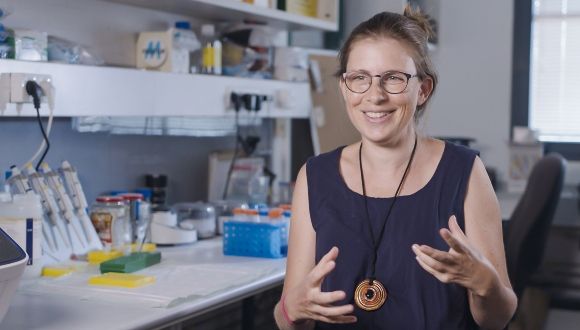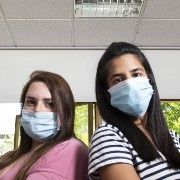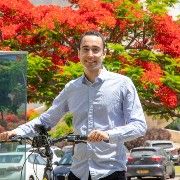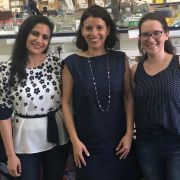Everything You Want to Know about COVID-19 but Were Afraid to Ask
As the world grapples with new waves of COVID-19 and dizzying amounts of information, we spoke with TAU’s Prof. Adi Stern for some insight. Stern, of the Shmunis School of Biomedicine and Cancer Research at the Wise Faculty of Life Sciences, is one of TAU’s leading virology researchers. Although coronaviruses are not her area of focus, she quickly shifted gears when the pandemic broke and has lent her expertise to studying SARS-CoV-2. She is also a member of the University’s recently-launched Center for Combating Pandemics.
What is the focus of your COVID-19 research?
My lab is currently focused on exploring patterns of evolution in the Delta variant and other strains. We are taking an in-depth look at immunocompromised patients who have recovered from COVID-19 and the possibility that the virus' interaction with their immune systems leads to variant mutations.
We’ve also started comparing SARS-CoV-2 to other coronaviruses that cause seasonal flus and illnesses. Depending on the results, we will potentially be able to use existing knowledge about seasonal viruses toward our understanding of COVID-19.
Please give an overview of the current situation.
The Delta variant has been taking over in countries around the world, including Israel. As opposed to earlier suspicions, we’re less concerned with the Delta variant breaking through existing defenses (like vaccines) and concentrating more on waning immunity—the wearing off of antibodies following vaccination or recovery, which leaves people more vulnerable to infection.
Can you expand on the issue of waning immunity?
The question is: how fast does this waning, or decrease in antibodies, take? We all knew it would be a possibility with COVID-19, but it happened at a faster rate than I anticipated. We didn’t initially know the rate of waning immunity for COVID-19; it was hard because we couldn’t gauge it from other vaccines as we’ve never experienced such a widespread pandemic in our lifetime.
It’s this waning immunity that has led to calls for a booster shot.
What is unique about Israeli contributions in the global war against COVID-19?
Israel is definitely a role model and now a leader in researching the interplay of vaccines and variants. We were the first country to deploy a vaccine drive, so we see the takeaways first. Half of Israel’s elderly population was vaccinated about four months before other countries. That’s why we saw more breakthrough cases earlier, with the U.K. trailing close behind. Other countries such as the U.S. are already preparing, or are considering, to offer booster shots with their eyes on Israel.
What are TAU’s strengths for driving COVID-19 research and understanding?
Research collaboration and proximity to affiliated hospitals give us a huge bonus that is extremely important for promoting research. Likewise, the diversity of expertise at TAU promotes the kind of multidisciplinary approach needed, from mathematics, clinical biology, social sciences and more.
In particular, TAU's Center for Combatting Pandemics along with the Shmunis School of Biomedicine and Cancer Research are driving world-leading research on COVID-19 and other diseases of global concern. Whenever I need advice or to collaborate, I can just walk across the hall.
What is the most concerning aspect of COVID-19?
The main concern, is that the virus evolves and it will continue to evolve until the entire world joins forces and gets vaccinated. The only solution mankind has known for any disease is widespread and comprehensive vaccination.
In Israel, we’re facing a fourth wave and have already rolled out booster shots. However, we’ve seen that boosters alone are not enough. I’m optimistic though, and I think we’ll overcome the fourth wave. We’re already seeing that the booster has tremendously positive results. Still, I'm thinking ahead to another six month and a year. I don’t know what will happen, but I’m concerned because borders are open and we’re connected to the world. We have to think toward the future.
What are some surprising characteristics of the virus?
The most unique aspect of SARS-CoV-2 is that it actually doesn’t have a high mutation rate compared to other RNA viruses. For example, SARS-CoV-2's mutation rate is about 10 times lower than that of HIV. Nonetheless, SARS-CoV-2 mutates at a rate that is high enough to create variants and thrive. This is mainly relevant to scientific examination of the genetic evolution of variants.
Additionally, the transmissibility of COVID-19 is actually not as high as certain other viral infections. For example, it is two-to-three times less contagious than measles, which has the highest-known transmissibility rate.
How has the pandemic affected the way you work?
Personally, the past 18 months have been very challenging as a biomedical researcher and mother of three. I have a three-year-old who would sit on my lap as I oversaw lab operations. It has been a test of work-life balance in the extreme between lockdowns and restrictions, but it has showed me that it’s possible to have this interplay between personal and professional life.
On the scientific side, many researchers have shifted their focus to studying COVID-19. In some cases, this has delayed research on other diseases. At the same time, it has pushed forward general research relevant to infectious disease and significantly advanced global collaboration. Now, scientific relationships that would have previously taken weeks or months are developing overnight.
What are your predictions going forward?
New knowledge about COVID-19 will enable the world to better prevent dissemination of this virus and potentially other viruses. I see the research being conducted in Israel and at TAU as continuing to make breakthroughs and help the world navigate the evolving reality of the pandemic.
By Julie Steigerwald






